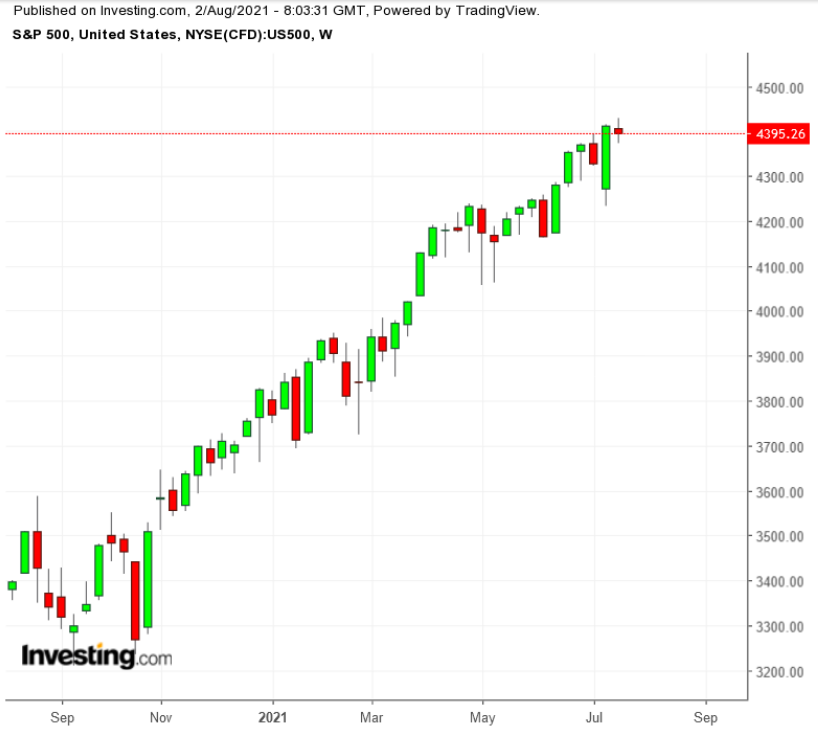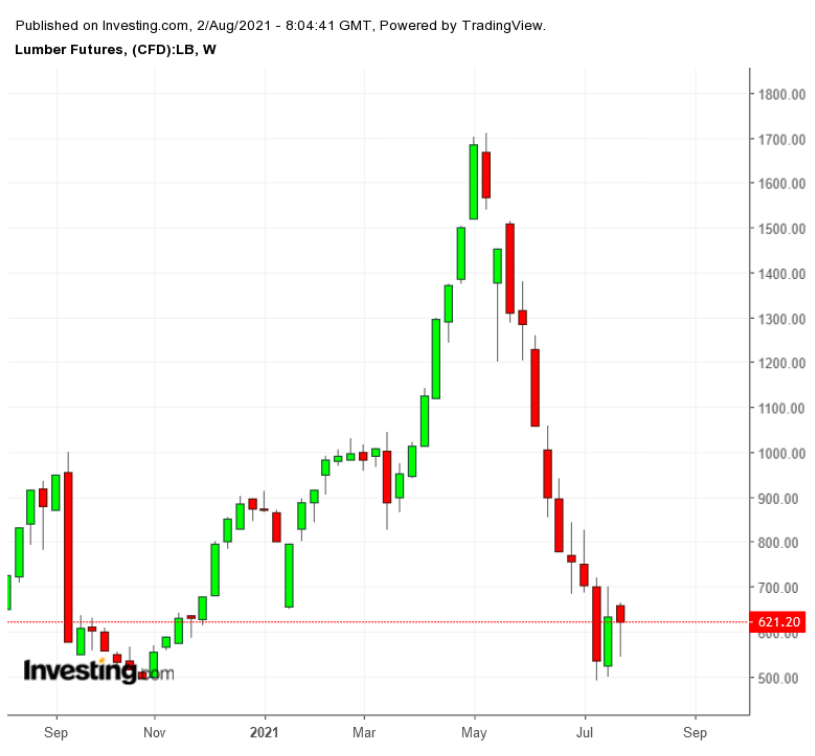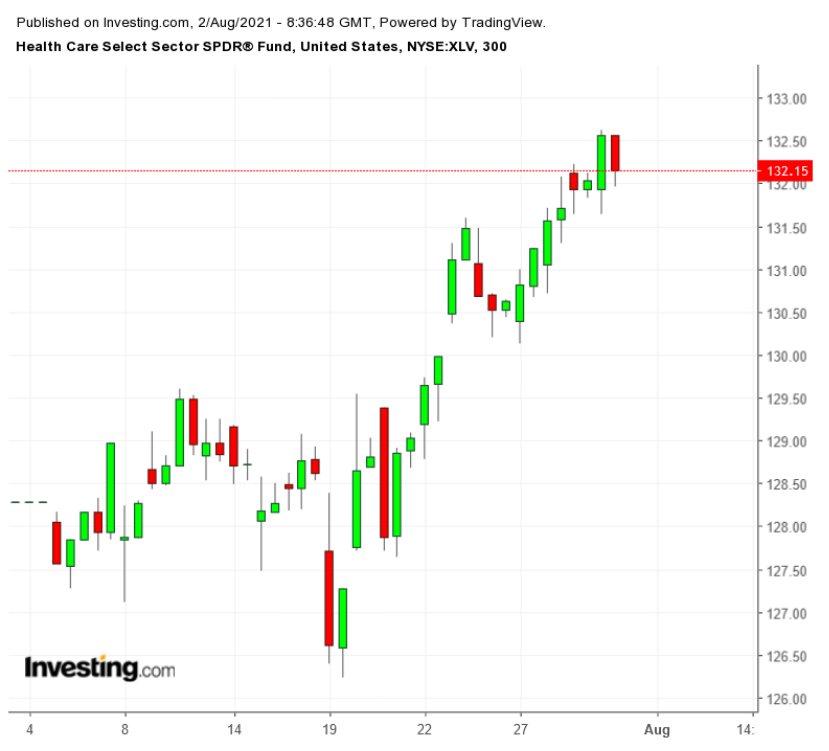July was a good month for stocks—but the good news was nuanced.
At the top of the list, the S&P 500 finished July up 2.28%, its sixth monthly gain in a row. The Dow Jones Industrial Average added 1.25%, its fifth monthly gain in the seven months of 2021, and the NASDAQ Composite rose 1.16%, its sixth gain in seven months since the tech-heavy index fell 1.5% in May.

For the year so far (and this gets bulls very excited), the S&P is up 17%. The Dow is up 14.1%, and the NASDAQ has risen 13.9%. Really fine numbers, on a par with 2019's results.
Additional good news, though nuanced as we've said: basically, the rally that erupted in late March 2020 as investors bet that COVID would be brought under control, is still in place. The S&P 500 is up more than 100% from the March 2020 bottom, with the NASDAQ up 121.3%. The Dow is up 92%.
So, yes, July seems to confirm that stocks are headed for a very good year in 2021. And they also are, so far, producing mostly better-than-expected earnings compared with a year ago. Companies are also boosting dividends and share buybacks.
And investors around the world want in. They spent $900 billion investing in mutual funds and exchange-traded funds in the first half of this year, The Wall Street Journal reported last week.
7 Record SPX Closes, But Escalating Uncertainties Too
July produced seven record closes for the S&P 500, according to Standard & Poor's, but the very end of the month saw some modest selling as uncertainties crept into the picture. Those include:
- The reemergence of COVID-19 as a major concern as the very contagious Delta variant spread across many countries.
- Inflation pressures that appeared because of shortages in labor, computer chips, lumber and other materials.
- China's crackdown on what it says are issues in its technology sector. The Shanghai Composite Index fell 5.4% in July. Hong Kong's Hang Seng Index (HSI) dropped nearly 10%. Baidu (NASDAQ:BIDU), one of the Asian nation's highest profile tech stocks dropped 19%.
- Bitcoin was up more than 118% on the year on Apr. 15. A massive selloff nearly wiped out the cryptocurrency's gains by July. But the digital token has taken off once again. As of Saturday, it was up 43.3% for the year.
- Robinhood Markets (NASDAQ:HOOD), the financial services platform best known for not charging commissions to buy stocks, as well as for its role as a major retail investor tool used to push stocks to insane heights, went public on Wednesday at $38 and fell 8.4% from that level on the first day of trading.
It is not clear if these issues will evolve into something that could break the big rally. But investors should be aware they're hovering.
Aging Rally, Pricey Shares, Narrower List Of Gainers
It's been true for some time that many stocks are pricey, especially tech shares on the NASDAQ 100 Index, and have been vulnerable to quick bouts of selling when bad news hits.
COVID is probably the biggest worry, but it is not clear if these issues will evolve into something that could break the rally. Still, investors should be aware of what's afoot.
In addition, the rally is getting older and depends on gains from a narrower roster of stocks, especially with market capitalizations of $1 trillion or more that overwhelm what's going on with other stocks. These include:
- Apple (NASDAQ:AAPL), up 6.3% for the month and 9.8% for the year. Market cap: $2.41 trillion.
- Microsoft (NASDAQ:MSFT), up 5.2% for July and 28% for the year. Market cap: $2.14 trillion.
- Google parent Alphabet (NASDAQ:GOOGL), up 11.2% in July and nearly 55% for year. Market cap: $1.8 trillion, including A and C shares.
- Amazon (NASDAQ:AMZN), down 3.3% for the month but up 2.2% for the year. Market cap: $1.68 trillion.
- Facebook (NASDAQ:FB), up 2.5% for July and 30.4% for the year. Market cap: $1.01 trillion.
This group alone accounts for 22.3% of the S&P 500's total market cap. Add in Tesla (NASDAQ:TSLA), Berkshire Hathaway (NYSE:BRKa) (NYSE:BRKb), NVIDIA (NASDAQ:NVDA) and JPMorgan Chase (NYSE:JPM), and the top 10 S&P 500 stocks represent nearly 28% of the market cap of the entire index. That's up from 21% from the end of 2018.
Investors may have some time to think about all this. August is often a quiet month as many traders go on vacation. In the last 20 years, the major averages have been flat or slightly lower during the month.
After COVID, the worry is inflation and the potential impact on interest rates. Rising rates could push stock and bond yields lower and choke off the economic recovery.
Other Drivers: Fed And Rates; US Economic Recovery; Commodity Prices
Oil prices are roughly up 50% this year. Retail gasoline prices are up more than 41%.

Lumber prices doubled in the first half of the year because of supply shortages. But the fever has broken, and prices are by more than 50%. The composite lumber price on lumber-pricing service Random Lengths has fallen about two thirds from its peak of $1,514 per thousand board feet in May.
The Federal Reserve, which controls interest rates, insists the price pressures will die down and doesn't plan to move rates for now. So far, bond investors are standing with the Fed. The widely followed 10-year Treasury yield ended the month at 1.226% after reaching 1.74% on Mar. 31. One reason rates are holding steady is that U.S. rates are attractive to foreign investors, many of whom face lower or negative rates via their home country's sovereign bonds.
Plus the U.S. economy has been stronger than many other economies, an added boost for U.S. stocks. The S&P Global Broad Market Index rose 0.32% in July, mostly thanks to the U.S. market's 1.68% gain, according to S&P analyst Howard Silverblatt.
A better picture of the U.S. economy should appear this week with the release of reports on factory orders, orders for non-manufacturing and two widely watched reports on jobs.
The first is Wednesday's ADP report on private employment and the Labor Department's monthly reports on Nonfarm Payrolls and unemployment, due Friday. Wall Street is expecting the payroll report to show 950,000 new jobs in July, with the unemployment rate falling to 5.7% from June's 5.9% reported rate.

The strongest sectors of the U.S. stock market in July were Health Care (+ 4.9%), Real Estate (+4.62%), Utilities (+4.33%) and Technology (up 3.89%). The weakest sectors were Industrials, Financials and Energy, which fell 8.2% overall, even as oil prices continued to move higher.
July's Top 5 S&P 500, Winners...:
- COVID-vaccine producer Moderna (NASDAQ:MRNA), up 50.5%.
- Chemical giant Albemarle (NYSE:ALB), a big producer of lithium used in batteries, up 22.3%.
- Dexcom (NASDAQ:DXCM), which makes glucose monitoring devices for diabetics, up 20.7%.
- Chip maker Monolithic Power Systems (NASDAQ:MPWR), up 20.3%.
- Restaurant operator Chipotle Mexican Grill (NYSE:CMG), up 20.2%.
...And Losers:
- Casino operator Las Vegas Sands (NYSE:LVS), down 19.6%.
- Casino operator Wynn Resorts (NASDAQ:WYNN), down 19.6%.
- Cruise line operator Norwegian Cruise Line Holding (NYSE:NCLH), down 18.3%.
- Cruise line operator Carnival Corp. (NYSE:CCL), down 17.9%.
- Diamondback Energy (NASDAQ:FANG), down 17.9%.
The top four are leisure and travel companies vulnerable to the pandemic; the fifth is an oil-and-gas producer.
Dows Jones Winners...:
- Nike (NYSE:NKE), up 8.4%.
- Honeywell International (NASDAQ:HON), up 6.6%.
- Apple, up 6.5%.
- Procter & Gamble (NYSE:PG), up 5.4%.
- Coca-Cola (NYSE:KO), up 5.4%.
...And Losers:
- Drugstore operator Walgreens Boots Alliance (NASDAQ:WBA), down 10.4%.
- Aerospace giant Boeing (NYSE:BA), down 5.5%.
- Construction equipment maker Caterpillar (NYSE:CAT), down 5%.
- Semiconductor maker Intel (NASDAQ:INTC) down 4.3%.
- International Business Machines (NYSE:IBM), down 3.8%.
July NASDAQ 100 Winners...:
- Moderna, up 50.5%.
- Atlassian Corp. (NASDAQ:TEAM), up 26.6%.
- Dexcom, glucose-monitoring-device-maker for diabetics, up 20.7%.
- Align Technologies (NASDAQ:ALGN), which makes digital orthodontic scanner equipment, up 13.88%.
- Chip maker Advanced Micro Devices (NASDAQ:AMD), up 13.1%.
